-
ORIGINAL ARTICLE03-11-2024
Ethnically distinct populations and coping with violence against children in the COVID-19 pandemic
Revista Brasileira de Enfermagem. 2024;77:e20230350
Abstract
ORIGINAL ARTICLEEthnically distinct populations and coping with violence against children in the COVID-19 pandemic
Revista Brasileira de Enfermagem. 2024;77:e20230350
DOI 10.1590/0034-7167-2023-0350
Views0See moreABSTRACT
Objective:
To identify policies and programs adopted by a Brazilian municipality to address violence against children during the COVID-19 pandemic.
Method:
A qualitative documentary study. The study setting was the municipality of Ananindeua, Pará, Brazil. Data was collected from official websites between November 2021 and February 2022. Thematic content analysis was used with the support of webQDA software.
Results:
Three empirical categories emerged: a) Impacts of the COVID-19 pandemic on violence against children; b) Action strategies for tackling violence against children in the COVID-19 pandemic; c) Evaluation indicators and targets for action strategies for tackling violence against children.
Final considerations:
The documents revealed few direct mentions of children, especially traditional populations; they presented superficial and ineffective evaluations of the policies and programs adopted, using exclusively quantitative indicators.
-
ORIGINAL ARTICLE03-11-2024
Experiences of women with physical disabilities in labor and delivery assistance
Revista Brasileira de Enfermagem. 2024;77:e20230290
Abstract
ORIGINAL ARTICLEExperiences of women with physical disabilities in labor and delivery assistance
Revista Brasileira de Enfermagem. 2024;77:e20230290
DOI 10.1590/0034-7167-2023-0290
Views0See moreABSTRACT
Objective:
To understand the meaning attributed by women with physical disabilities to the health care received and expected during labor and delivery.
Methods:
Qualitative study, based on Social Network Theory, conducted through an online workshop in April 2022, with the participation of six women with physical disabilities. Data, collected through the focus group technique, underwent thematic content analysis with the assistance of the IRaMuTeQ tool.
Results:
Three thematic categories emerged: Challenges experienced during pregnancy; The experience within the maternity ward; and, The importance of social networks. The assistance provided by healthcare professionals sometimes differed between what was expected and what was received by women with physical disabilities during labor and delivery.
Final Considerations:
Experiences were predominantly negative, resulting from inappropriate professional conduct due to ableist attitudes. Support from members of social networks is crucial for preventing stressors.

-
03-11-2024
O uso da ultrassonografia point-of-care na prática clínica do enfermeiro como alicerce para a segurança do paciente
Revista Brasileira de Enfermagem. 2024;77:e77suppl0201
Abstract
O uso da ultrassonografia point-of-care na prática clínica do enfermeiro como alicerce para a segurança do paciente
Revista Brasileira de Enfermagem. 2024;77:e77suppl0201
DOI 10.1590/0034-7167.202477suppl0201pt
Views0Recentemente, mais um caso de dano grave associado ao cuidado em saúde foi reportado pela mídia. Uma jovem grávida teve a mão e o punho amputados depois de dar à luz ao terceiro filho em um hospital do Rio de Janeiro(). Após o incidente ocasionado pelo acesso vascular, a mulher apresentou hemorragia e foi reinternada.Os […]See more -
REVIEW03-11-2024
Continuing nursing education actions in the face of homophobia: an integrative review
Revista Brasileira de Enfermagem. 2024;77:e20230094
Abstract
REVIEWContinuing nursing education actions in the face of homophobia: an integrative review
Revista Brasileira de Enfermagem. 2024;77:e20230094
DOI 10.1590/0034-7167-2023-0094
Views0See moreABSTRACT
Objectives:
to analyze continuing nursing education actions in the scientific literature in the face of homophobia.
Methods:
an integrative literature review with structured search in June 2022 in eight databases, using the descriptors Nursing Education, Homophobia, Sexual and Gender Minorities. Final sample consisted of six primary studies.
Results:
continuing nursing education actions are supported by strategies such as use of teaching materials, lectures, case studies and focus groups, addressing content such as gender identity issues and affective-sexual orientation, health disparities and their relationship with homophobia in healthcare settings.
Final considerations:
carried out in various healthcare settings, continuing education actions proved to be successful in raising nurses’ awareness in facing homophobia in health services, however, their expansion is necessary to create health spaces that meet the specific needs of these people.

-
03-11-2024
The use of point-of-care ultrasound in nurses’ clinical practice as a foundation for patient safety
Revista Brasileira de Enfermagem. 2024;77:e77suppl0201
Abstract
The use of point-of-care ultrasound in nurses’ clinical practice as a foundation for patient safety
Revista Brasileira de Enfermagem. 2024;77:e77suppl0201
DOI 10.1590/0034-7167.202477suppl0201
Views0Recently, another case of serious harm associated with healthcare was reported by the media. A young pregnant woman had her hand and wrist amputated after giving birth to her third child in a hospital in Rio de Janeiro(). After the incident caused by vascular access, the woman suffered hemorrhage and was readmitted.The harm caused to […]See more -
03-08-2024
A enfermagem como protagonista no enfrentamento da hesitação e recusa vacinal
Revista Brasileira de Enfermagem. 2024;77:e77suppl101
Abstract
A enfermagem como protagonista no enfrentamento da hesitação e recusa vacinal
Revista Brasileira de Enfermagem. 2024;77:e77suppl101
DOI 10.1590/0034-7167.202477suppl101pt
Views0Desde a década de 1970, o Ministério da Saúde do Brasil instituiu o Programa Nacional de Imunização (PNI), que precedeu o Sistema Único de Saúde e que lhe foi incorporado e fortalecido, devido ao modelo descentralizado aos municípios, mas de comando único ao nível central. Seu objetivo era e ainda é coordenar as ações de […]See more -
03-08-2024
Nursing as a player in tackling vaccine hesitancy and refusal
Revista Brasileira de Enfermagem. 2024;77:e77suppl101
Abstract
Nursing as a player in tackling vaccine hesitancy and refusal
Revista Brasileira de Enfermagem. 2024;77:e77suppl101
DOI 10.1590/0034-7167.202477suppl101
Views1Since the 1970s, the Brazilian Ministry of Health established the Brazilian National Immunization Program (PNI – Programa Nacional de Imunização), which preceded the Brazilian Health System and which was incorporated and strengthened due to the decentralized model to municipalities, but under single command at central level. Its objective was and still is to coordinate vaccination […]See more -
02-26-2024
Nurse Navigator of Cancer Patients: contributions to the discussion on the national stage
Revista Brasileira de Enfermagem. 2024;77(2):e770201
Abstract
Nurse Navigator of Cancer Patients: contributions to the discussion on the national stage
Revista Brasileira de Enfermagem. 2024;77(2):e770201
DOI 10.1590/0034-7167.2024770201
Views0The professional practice of patient navigation is incipient in Brazil and, therefore, a broad discussion with various sectors of society is essential, which is the main purpose of this editorial. Shall we start with the story.Patient navigation was defined in 1989 as a community-based service delivery intervention aimed at appropriately promoting access to diagnosis and […]See more
-
ORIGINAL ARTICLE05-08-2023
Precarious work at a surgical center: implications for the organization and for the health of nursing workers
Revista Brasileira de Enfermagem. 2023;76(2):e20220120
Abstract
ORIGINAL ARTICLEPrecarious work at a surgical center: implications for the organization and for the health of nursing workers
Revista Brasileira de Enfermagem. 2023;76(2):e20220120
DOI 10.1590/0034-7167-2022-0120
Views0See moreABSTRACT
Objectives:
to analyze the implications of precarious work for the organization of work and for the health of nursing professionals in a surgical center.
Methods:
qualitative, descriptive study in which the interview technique was applied on 30 nursing professionals from a surgical center in a university hospital located in the Southeast region of Brazil. The project was approved by the research ethics committee. Thematic content analysis was applied in the categorization of speeches.
Results:
precarious work in the surgical center negatively affects the organization of work due to staff turnover, loss of skilled talent, and the need for continuous training of temporary workers. It also affects the quality of care, leading to risks to patient safety and workers’ health.Final Considerations: it is important to make work conditions less precarious in order to minimize staff turnover and promote the quality of the service offered and the health of the worker.
-
ORIGINAL ARTICLE04-07-2023
Suicide attempts by adolescents assisted in an emergency department: a cross-sectional study
Revista Brasileira de Enfermagem. 2023;76(2):e20220137
Abstract
ORIGINAL ARTICLESuicide attempts by adolescents assisted in an emergency department: a cross-sectional study
Revista Brasileira de Enfermagem. 2023;76(2):e20220137
DOI 10.1590/0034-7167-2022-0137
Views1See moreABSTRACT
Objectives:
to identify and characterize the care provided to adolescents admitted to an emergency department due to a suicide attempt.
Methods:
an observational, cross-sectional, descriptive study with a retrospective approach, carried out with medical records of adolescents aged 10 to 19 admitted for suicide attempts, between January 2015 and July 2020, in an emergency department. Data were subjected to descriptive and inferential analysis.
Results:
eighty-eight service occurrences were identified, mainly to females, exposed to multiple risk factors. Exogenous intoxication was the main method used, occurring at home and on weekdays. There were systemic repercussions, requiring multiple interventions and hospitalizations. Only 26% of cases were notified.
Conclusions:
adolescents treated for suicide attempts were exposed to multiple risk factors, with intoxication as the main means used. There is concern about the underreporting of cases and the logic of clinical care and medicalization.
-
ORIGINAL ARTICLE02-06-2023
Family caregivers’ itineraries of preschool children who survived leukemia: implications for primary healthcare nursing
Revista Brasileira de Enfermagem. 2023;76(2):e20220193
Abstract
ORIGINAL ARTICLEFamily caregivers’ itineraries of preschool children who survived leukemia: implications for primary healthcare nursing
Revista Brasileira de Enfermagem. 2023;76(2):e20220193
DOI 10.1590/0034-7167-2022-0193
Views0See moreABSTRACT
Objectives:
to analyze the path taken by family caregivers of preschool children who survived leukemia and discuss the implications for primary healthcare nursing.
Methods:
the narrative interview guided by a talking map and body knowledge was used with family members of children who survived leukemia, living in Rio de Janeiro (capital) and São Paulo (countryside). Conversation analysis was applied to the data.
Results:
five family groups (seven people) of five children started their journey in the professional subsystem of private services; four were assisted in the private sector since the onset of the illness; one was assisted in public and private services. Living conditions reduced barriers to accessing supplementary health, facilitating coordination, and listening to a reference professional.
Final Considerations:
the itinerary was marked by attentive listening to family caregivers by reference professionals, favoring early diagnosis, initiation of treatment, and resolution of leukemia with the cure of children.
-
ORIGINAL ARTICLE05-08-2023
Trend in hospitalizations due to ambulatory care-sensitive conditions in the Federal District
Revista Brasileira de Enfermagem. 2023;76(2):e20220351
Abstract
ORIGINAL ARTICLETrend in hospitalizations due to ambulatory care-sensitive conditions in the Federal District
Revista Brasileira de Enfermagem. 2023;76(2):e20220351
DOI 10.1590/0034-7167-2022-0351
Views0See moreABSTRACT
Objectives:
to analyze the trend, according to sex, of Ambulatory Care-Sensitive Conditions in the Primary Health Care of the Federal District, from 2009 to 2019.
Methods:
ecological trend study using ACSC hospitalization data available in the Hospitalization System of the Single Health System. The Prais-Winsten method was used to calculate the annual rate variation, expressed in percentages. The dependent variable was the logarithm of the rates, and the independent one, the years in the time series.
Results:
the Federal District registered 2,103,951 general hospitalizations, 16.4% of which were due to Ambulatory Care-Sensitive Conditions. Males had a higher rate of hospitalization in the period, and both sexes showed a stationary trend.
Conclusions:
the time trend of Ambulatory Care- Sensitive Conditions was stationary, but further studies are necessary regarding primary health care coverage.
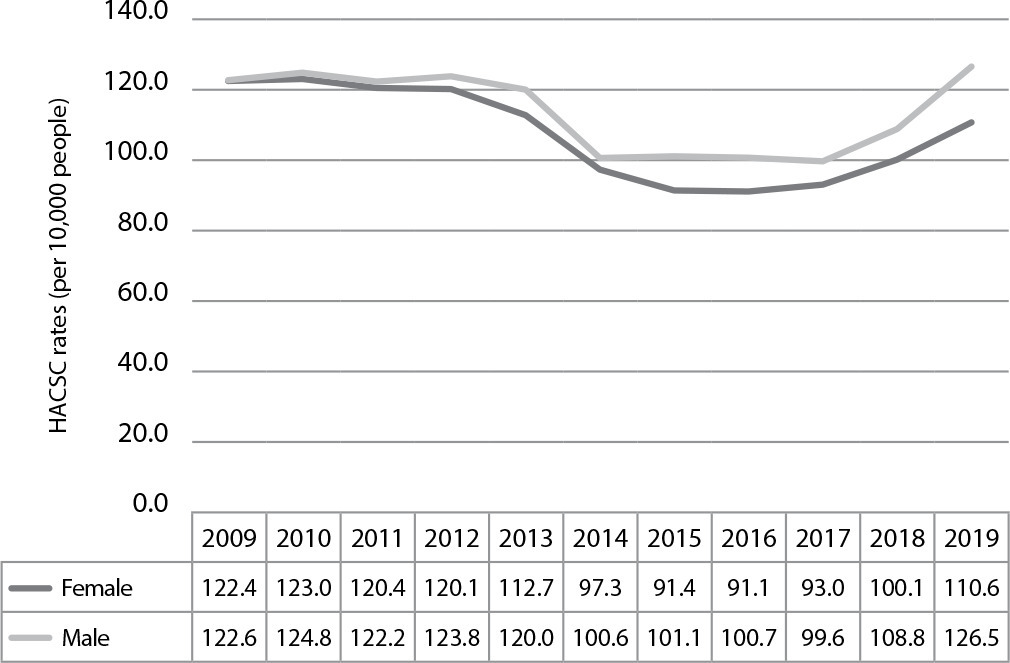
-
ORIGINAL ARTICLE03-17-2023
Characteristics of work in primary care identified in the collective exercise of application of the SWOT matrix
Revista Brasileira de Enfermagem. 2023;76(2):e20220443
Abstract
ORIGINAL ARTICLECharacteristics of work in primary care identified in the collective exercise of application of the SWOT matrix
Revista Brasileira de Enfermagem. 2023;76(2):e20220443
DOI 10.1590/0034-7167-2022-0443
Views0See moreABSTRACT
Objective:
to understand how variables strengths, weaknesses, opportunities and threats make it possible to characterize work in Primary Health Care, to collectively propose strategies for systematizing this process with Family Health teams.
Methods:
methodological research, with 23 participants in direct relationship with Primary Care, including representatives of segments: care (work), management and social control. In one of the three pedagogical meetings, the SWOT matrix was used as a tool for organizational work planning.
Results:
applying the matrix resulted in the following thematic categories: Teamwork and regulations: key elements for interprofessionality at work; Continuing Health Education: path to autonomy and participatory management (co-management).
Final considerations:
the study promoted the systematization of teams’ work, through the mobilization of sectors and distribution of tasks, involving professionals in the co-management of the process.
-
ORIGINAL ARTICLE03-27-2023
Adaptation and validation of an adult patient classification instrument with emphasis on the family dimension
Revista Brasileira de Enfermagem. 2023;76(2):e20220530
Abstract
ORIGINAL ARTICLEAdaptation and validation of an adult patient classification instrument with emphasis on the family dimension
Revista Brasileira de Enfermagem. 2023;76(2):e20220530
DOI 10.1590/0034-7167-2022-0530
Views1See moreABSTRACT
Objectives:
to adapt and validate an instrument for classifying adult patients that emphasizes the family support network in the demand for nursing care.
Methods:
methodological study, carried out in three phases: adaptation of an instrument considering the reality of adult patients; content validation with seven experts and assessment of measurement properties (construct validity and internal consistency) with 781 hospitalized patients.
Results:
in content validation, the indicators reached the values established for the Content Validity Index (0.85-1.00). In the confirmatory factor analysis, the 11 indicators were distributed in three domains and presented average variance extracted and factor loading greater than 0.5. Composite reliability was greater than 0.7.
Conclusions:
the present study adapted and made available, with evidence of validity and reliability, an instrument for classifying adult patients that considers the family support network in the demand for nursing care.

-
ORIGINAL ARTICLE05-08-2023
Interactive gerontechnology for fall prevention in the elderly: a descriptive study
Revista Brasileira de Enfermagem. 2023;76(2):e20220739
Abstract
ORIGINAL ARTICLEInteractive gerontechnology for fall prevention in the elderly: a descriptive study
Revista Brasileira de Enfermagem. 2023;76(2):e20220739
DOI 10.1590/0034-7167-2022-0739
Views0See moreABSTRACT
Objectives:
to develop interactive gerontechnology for the prevention of falls in the elderly at home.
Methods:
an exploratory and descriptive study that consisted of gerontechnology development and evaluation by experts and the target audience. For evaluation, researchers used the Agreement Index (AI), considering values greater than 80%.
Results:
the three-dimensional virtual scale model was elaborated through the SketchUp program, with the distribution of rooms and floors, constituting Prototype 1 (P1). Fifty-four judges evaluated the P1, and all presented agreement above the established, with a minimum AI of 88% and a maximum of 100%, producing Prototype 2 (P2). Thirty elderly participants from a philanthropic institution evaluated Prototype 2. On all items, AI ranged from 83% a 100%, resulting in the final version.
Conclusions:
the product of this research reveals itself as an innovative and scientifically based tool aimed at preventing falls in the elderly.
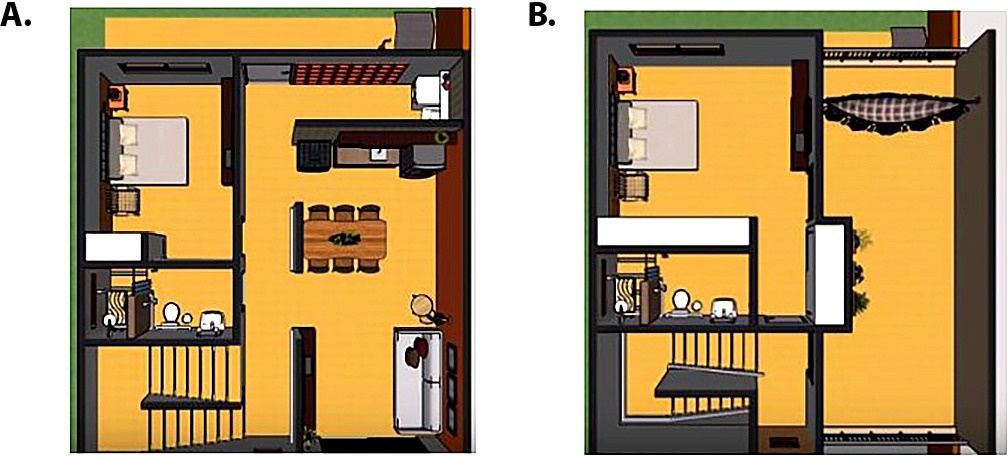
-
ORIGINAL ARTICLE08-21-2023
Effectiveness of educational intervention among seropositive women about knowledge about HIV sexual transmission
Revista Brasileira de Enfermagem. 2023;76(3):e20220371
Abstract
ORIGINAL ARTICLEEffectiveness of educational intervention among seropositive women about knowledge about HIV sexual transmission
Revista Brasileira de Enfermagem. 2023;76(3):e20220371
DOI 10.1590/0034-7167-2022-0371
Views0See moreABSTRACT
Objectives:
to assess the effectiveness of a group and telephone educational intervention with seropositive women about knowledge about HIV sexual transmission prevention.
Methods:
a quasi-experimental before-and-after study, carried out with 151 women living with HIV in a Specialized Care Service in a Brazilian capital. The educational intervention was carried out in three moments, with the assessment being carried out before the first and after the last moment.
Results:
97.4% of study participants were cisgender women aged between 18 and 58 years; 55.6% considered themselves brown; and 32.5% of interviewees had elementary school. Regarding knowledge about HIV sexual transmission, in 78.5% of items, there was an association (p<0.005) with increased participants’ knowledge after receiving the intervention.
Conclusions:
the educational intervention helped to increase the knowledge of women living with HIV about the sexual transmission of the infection.

-
09-16-2019
Nursing practices centered on individuals with tuberculosis: an interface with democracy
Revista Brasileira de Enfermagem. 2019;72(5):1219-1225
Abstract
Nursing practices centered on individuals with tuberculosis: an interface with democracy
Revista Brasileira de Enfermagem. 2019;72(5):1219-1225
DOI 10.1590/0034-7167-2017-0380
Views0See moreABSTRACT
Objective:
To analyze whether user-centered nursing practices in TB DOT are being carried out and are contributing to democracy.
Method:
A cross-sectional, exploratory, descriptive study with 123 nurses in three capital cities with high incidence of TB (Manaus-AM, João Pessoa-PB, Porto Alegre-RS) in Brazil. Data were collected from January to June 2014. Descriptive and multiple correspondence analyzes were used.
Results:
It was identified that the most user-centered care actions had scores below 50%, considered unfavorable to the exercise of democracy. In the analysis of the general user-centered practice score per municipality, Manaus and João Pessoa presented unfavorable results, and the municipality of Porto Alegre was partially favorable.
Conclusion:
The three municipalities need to advance in the implementation of user-centered practices in DOT, because their health system still has difficulties and challenges to overcome.
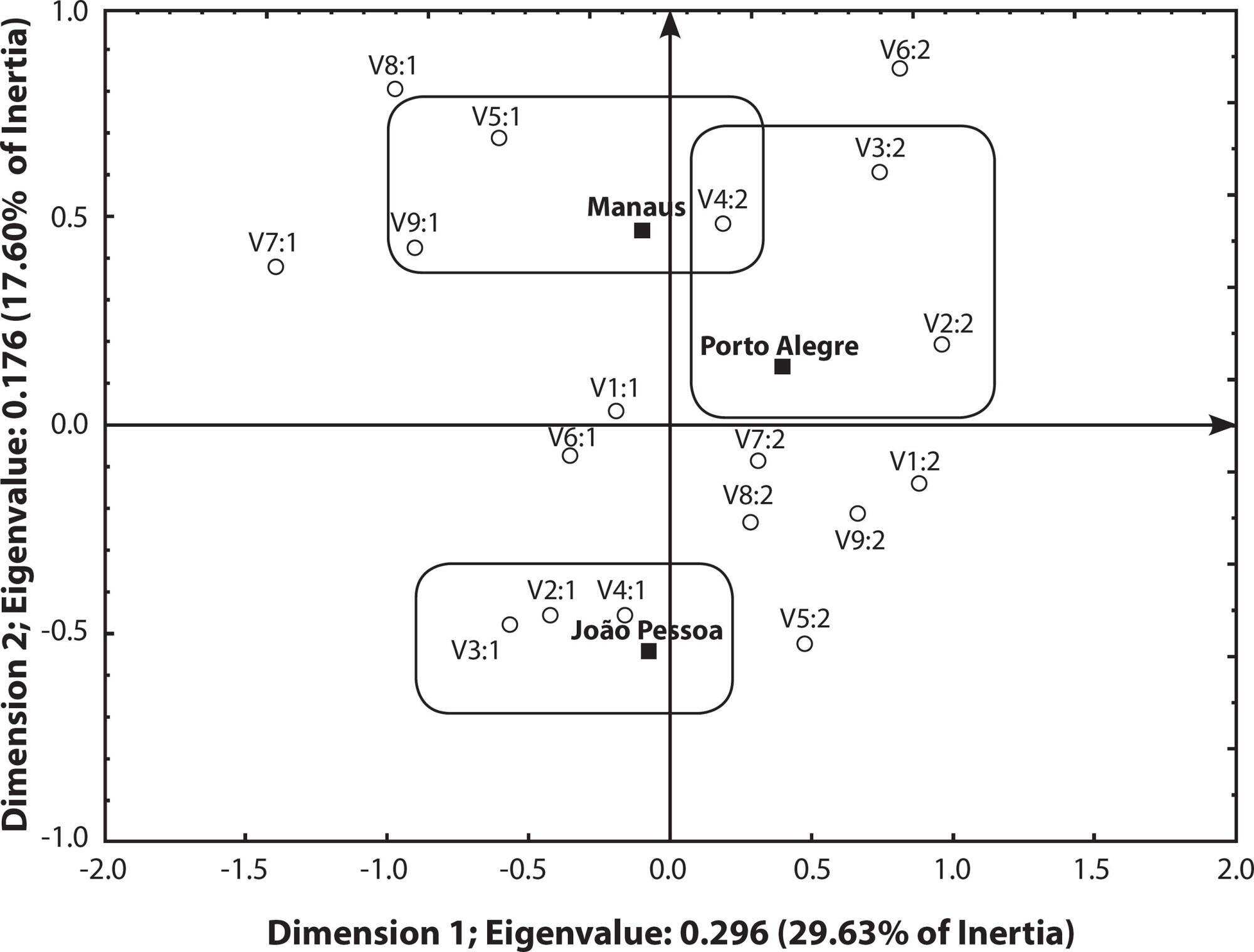
-
ORIGINAL ARTICLE08-10-2020
Palliative care consultation team: symptom relief in first 48 hours of hospitalization
Revista Brasileira de Enfermagem. 2020;73(6):e20190391
Abstract
ORIGINAL ARTICLEPalliative care consultation team: symptom relief in first 48 hours of hospitalization
Revista Brasileira de Enfermagem. 2020;73(6):e20190391
DOI 10.1590/0034-7167-2019-0391
Views0See moreABSTRACT
Objective:
To compare the relief of symptoms provided by palliative care consultation team (PCCT) compared to the traditional care team (TC), in patients with advanced cancer in the first 48 hours of hospitalization.
Method:
Allocated to PCCT Group and TC Group, this study assessed 290 patients according to the Edmonton Symptom Assessment System (ESAS) within the first 48 hours of hospitalization. The main outcome was a minimum 2-point reduction in symptom intensity.
Results:
At 48 hours, the PCCT Group had a 2-point reduction in the mean differences (p <0.001) in pain, nausea, dyspnea, and depression; and TC Group, on nausea and sleep impairment (p <0.001). Multiple Logistic Regression found for the PCCT Group a greater chance of pain relief (OR 2.34; CI 1.01-5.43; p = 0.049).
Conclusion:
There was superiority of the PCCT Group for pain relief, dyspnea and depression. There is a need for more studies that broaden the understanding of team modalities.
-
ORIGINAL ARTICLE10-21-2019
Work overload and risk behaviors in motorcyclists
Revista Brasileira de Enfermagem. 2019;72(6):1479-1484
Abstract
ORIGINAL ARTICLEWork overload and risk behaviors in motorcyclists
Revista Brasileira de Enfermagem. 2019;72(6):1479-1484
DOI 10.1590/0034-7167-2018-0279
Views0See moreABSTRACT
Objective:
to analyze the association between work overload and risk behaviors adopted by motorcyclists.
Method:
a cross-sectional study of injured motorcycle drivers hospitalized at the Hospital da Restauração Governador Paulo Guerra in the city of Recife, PE, from May to September 2016. A questionnaire was applied containing sociodemographic variables related to work overload and risk behaviors adoption. Odds Ratio (OR) and 95% Confidence Interval were used to analyze the association between the variables.
Results:
there was a predominance of males (97.6%), mean age 31.44 years (SD = 9.50). There was an association of sleep/fatigue at the accident time with difficulties carrying out work tasks (OR = 3.7), feeling tired during work (OR = 4.6) and feeling under pressure to carry out work tasks (OR = 3.5).
Conclusion:
work overload was associated with risk behaviors adoption. It is believed that this fact can have an impact on the occurrence and severity of accidents.
-
ORIGINAL ARTICLE02-05-2021
Homeless people: health aspects and experiences with health services
Revista Brasileira de Enfermagem. 2021;74(1):e20190200
Abstract
ORIGINAL ARTICLEHomeless people: health aspects and experiences with health services
Revista Brasileira de Enfermagem. 2021;74(1):e20190200
DOI 10.1590/0034-7167-2019-0200
Views0See moreABSTRACT
Objectives:
to analyze the understanding of homeless people living in a city in the countryside of São Paulo about what health is and about their experiences in health services.
Methods:
a qualitative exploratory study developed through interviews with homeless people and a field diary. The data were organized by themes and the findings were compared to a collective health framework.
Results:
the explored themes were: “Being healthy for the homeless population”, “The search for health services” and “Being a user of health services from the perspective of homeless people”. We present the interviewees’ understanding of health and their experiences in healthcare services. Along this path, we outline aspects that show the network’s weaknesses, permeated by prejudices and discrimination.
Final Considerations:
this population has conceptions about health and needs that need to be singularly taken into consideration to facilitate access and care.
-
ORIGINAL ARTICLE02-17-2020
Professional who attended childbirth and breastfeeding in the first hour of life
Revista Brasileira de Enfermagem. 2020;73(2):e20180448
Abstract
ORIGINAL ARTICLEProfessional who attended childbirth and breastfeeding in the first hour of life
Revista Brasileira de Enfermagem. 2020;73(2):e20180448
DOI 10.1590/0034-7167-2018-0448
Views0See moreABSTRACT
Objectives:
To investigate the association between the professionals who attended vaginal delivery and breastfeeding in the first hour of life.
Methods:
This is a cross-sectional study with data from the Nascer no Brasil (Born in Brazil) survey, conducted in the 2011-2012 period. Data from 8,466 puerperae were analyzed using a logistic regression model with a hierarchical approach.
Results:
The proportion of mothers who breastfed at birth was higher in deliveries attended by nurses (70%). A nurse-assisted delivery was 64% more likely to breastfeed in the first hour of life. Other factors associated with the outcome: residing in the North; age less than 35 years; multiparity; prenatal guidance on breastfeeding in the first hour of life; birth at Baby-Friendly Hospital; companion at birth; and female newborn.
Conclusions:
Obstetrician nurse/nurse-assisted delivery was a significant independent factor associated with breastfeeding in the first hour of life, suggesting the importance of strengthening the role of the obstetrician nurse.
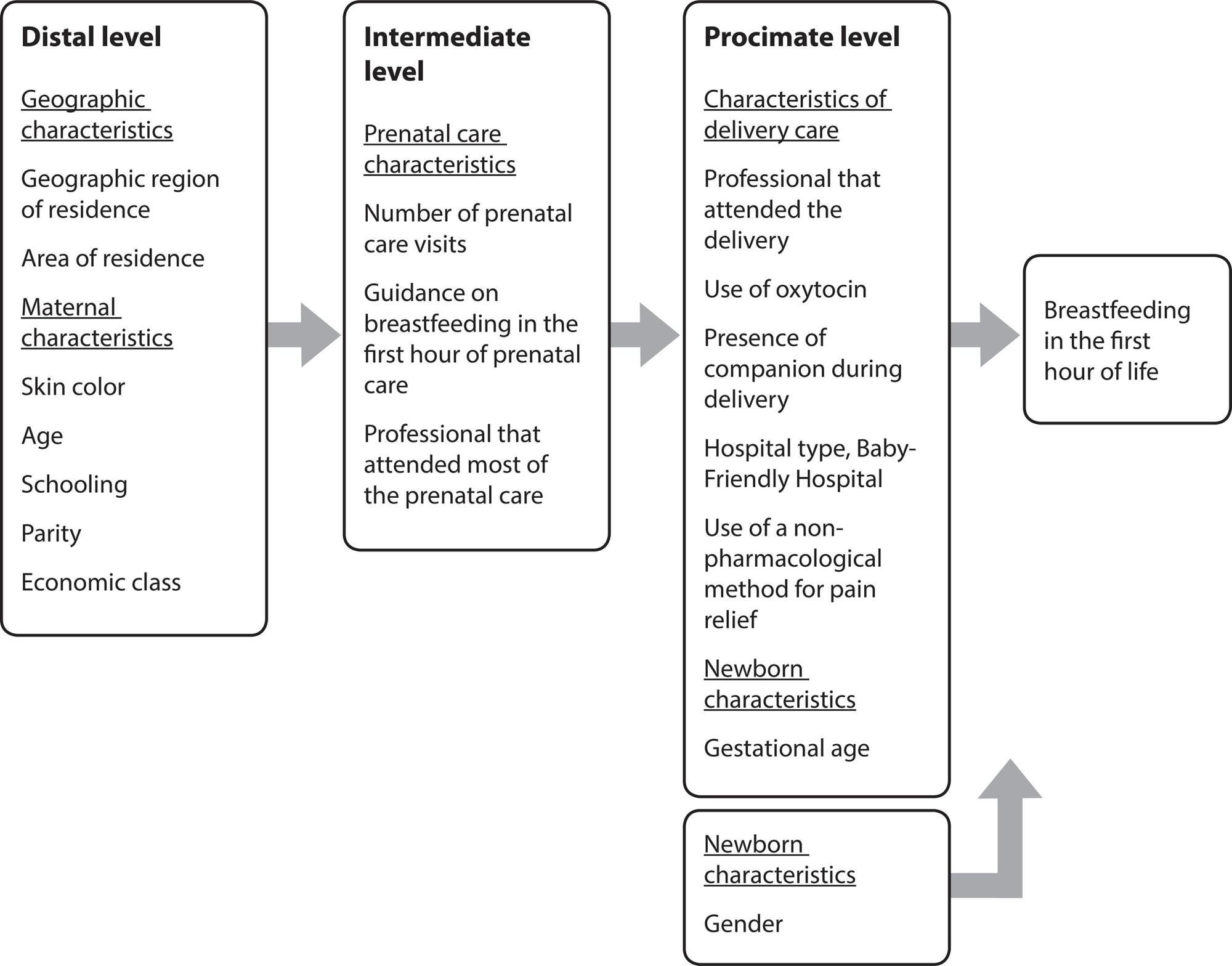
-
ORIGINAL ARTICLE02-17-2020
Predictive model of hospitalization for children and adolescents with chronic disease
Revista Brasileira de Enfermagem. 2020;73(2):e20180467
Abstract
ORIGINAL ARTICLEPredictive model of hospitalization for children and adolescents with chronic disease
Revista Brasileira de Enfermagem. 2020;73(2):e20180467
DOI 10.1590/0034-7167-2018-0467
Views0See moreABSTRACT
Objectives:
Describe a predictive model of hospitalization frequency for children and adolescents with chronic disease.
Methods:
A decision tree-based model was built using a database of 141 children and adolescents with chronic disease admitted to a federal public hospital; 18 variables were included and the frequency of hospitalization was defined as the outcome.
Results:
The decision tree obtained in this study could properly classify 80.85% of the participants. Model reading provided an understanding that situations of greater vulnerability such as unemployment, low income, and limited or lack of family involvement in care were predictors of a higher frequency of hospitalization.
Conclusions:
The model suggests that nursing professionals should adopt prevention actions for modifiable factors and authorities should make investments in health promotion for non-modifiable factors. It also enhances the debate about differentiated care to these patients.

-
ORIGINAL ARTICLE12-04-2020
Effectiveness of therapeutic groups in psychosocial care: analysis in the light of yalom’s therapeutic factors
Revista Brasileira de Enfermagem. 2020;73:e20200410
Abstract
ORIGINAL ARTICLEEffectiveness of therapeutic groups in psychosocial care: analysis in the light of yalom’s therapeutic factors
Revista Brasileira de Enfermagem. 2020;73:e20200410
DOI 10.1590/0034-7167-2020-0410
Views0See moreABSTRACT
Objective:
to describe professionals’ perceptions about the therapeutic effectiveness of group care.
Method:
a descriptive, exploratory, qualitative research of the type of intervention carried out with 30 professionals from Psychosocial Care Centers for Alcohol and Drugs in a municipality in center-westerns Brazil, from March to April 2019. Self-applicable instruments and round circles were used. The emerging data were submitted to content analysis.
Results:
professionals perceive the benefits of group practices and relate them to some therapeutic factors in the group. It is evident the little formal and systematized knowledge about the group process elements.
Final Considerations:
the therapeutic effectiveness of group processes is compromised due to absence of systematic records that allow to perceive the therapeutic progress of users, even though professionals perceive the emergence of therapeutic factors of the groups in the context of psychosocial care.
-
REVIEW03-30-2020
Care of the self in the daily living of nurses: an integrative review
Revista Brasileira de Enfermagem. 2020;73(2):e20180668
Abstract
REVIEWCare of the self in the daily living of nurses: an integrative review
Revista Brasileira de Enfermagem. 2020;73(2):e20180668
DOI 10.1590/0034-7167-2018-0668
Views0See moreABSTRACT
Objectives:
to identify if nurses care for themselves and describe such practices.
Methods:
this is an integrative review of the literature published between 2006 and 2018 and indexed in the Literatura Latino-Americana e do Caribe em Ciências da Saúde, Medical Literature Analysis and Retrieval System Online and Web of Science databases.
Results:
the sample totaled 20 articles, grouped by content similarity in the thematic categories “limits and possibilities for the care of the self”, “knowledge about practices on the care of the self” and “implications of care of the self in professional practice”.
Final considerations:
the knowledge about techniques on caring for the self allows nurses to develop themselves personally and professionally. We suggest to managers and administrators a redirection of the nursing practice that contemplates the strengthening of the nurse as the manager of care and leader of the team, as well as the inclusion of the concept of care of the self in the curricula of undergraduate and graduate nursing courses.
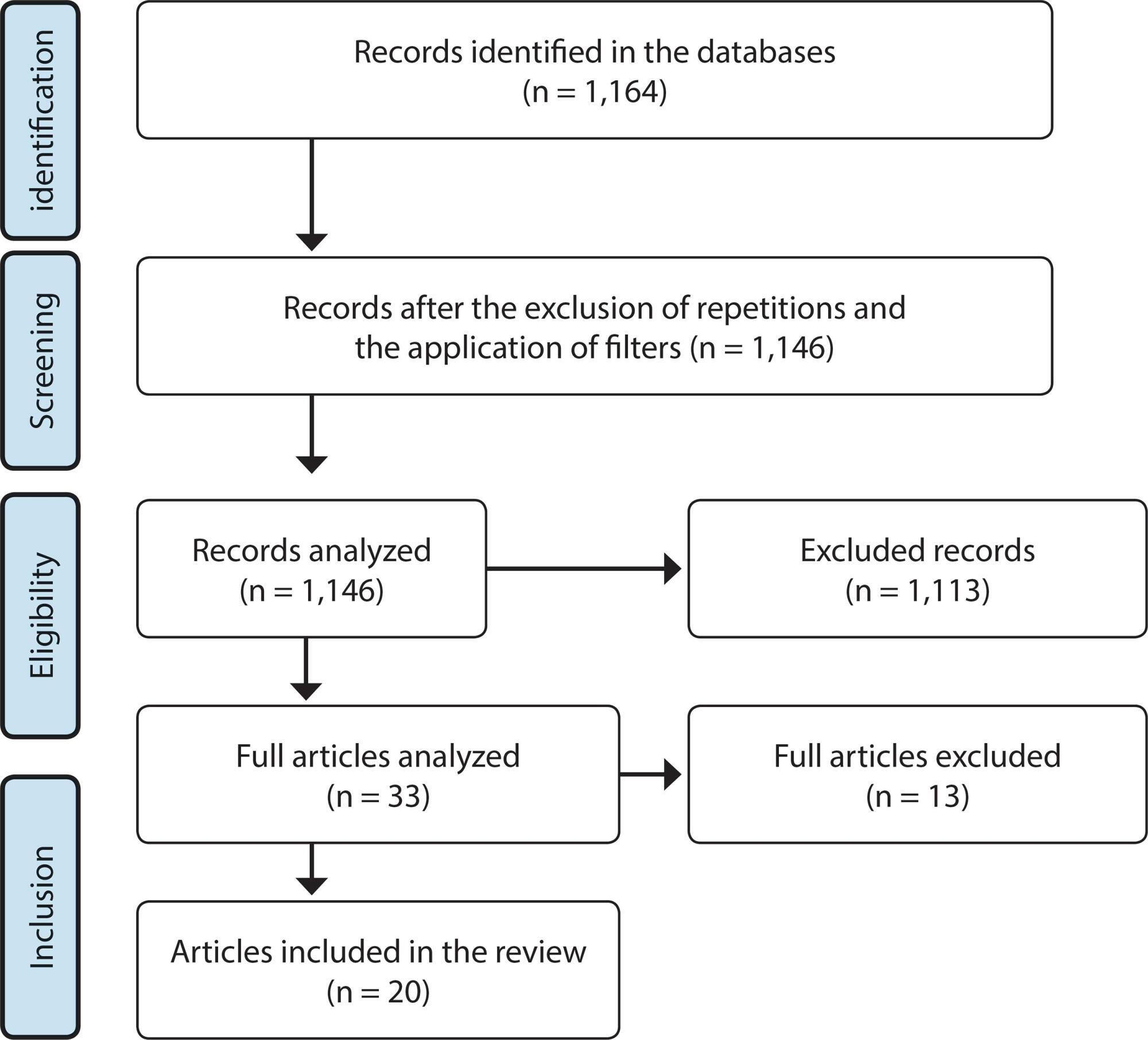
Search
Search in:
Nuvem de Tags
Adolescente (85) Atenção Primária à Saúde (239) COVID-19 (91) Criança (91) Cuidados de Enfermagem (269) Educação em Enfermagem (151) Educação em Saúde (139) Enfermagem (930) Enfermagem Pediátrica (86) Estudantes de Enfermagem (77) Estudos de Validação (131) Família (87) Idoso (208) Promoção da Saúde (99) Qualidade de Vida (104) Saúde do Trabalhador (86) Saúde Mental (145) Saúde Pública (82) Segurança do Paciente (150) Tecnologia Educacional (100)



